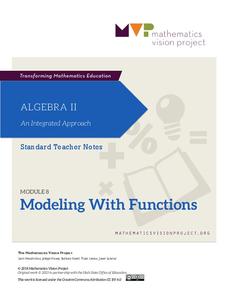Curated OER
The Barbie Bungee Drop
What do math, bungee jumping, and Barbie® have in common? Young adventure seekers use rubber bands as bungee cords to predict a thrilling, but safe, jump for their doll. First, test jumps are conducted with a few rubber bands. Then more...
Curated OER
Bungee M&M's
Science is exciting - and delicious! Pairs of learners set up a bungee cord type of experiment. They use buckets filled with M & M's, a meter stick, and a Slinky spring (as the bungee) to conduct their experiment. A good activity...
Museum of Science
Egg Bungee
Think bungee jumping looks scary? Knowing the science behind bungee jumping might make it less so. Using an egg and rubber bands, young engineers model bungee jumping. They test the distances that the egg falls for different numbers of...
Curated OER
How Long Can You Go?
Eighth graders examine the usefulness of a line of best fit by collecting and graphing data, using a graphing calculator to determine the line of best fit, and making a variety of predictions. They watch a video, then design a...
Curated OER
Barbie Bungee
Middle and high schoolers collect and analyze their data. In this statistics lesson, pupils analyze graphs for linear regression as they discuss the relationship of the function to the number of rubber bands and the distance of the...
Radford University
Action Bungee Jump
Drop scatter plots onto the class. Teams collect data to determine how far an action figure will fall suspended by rubber bands. Using the collected data, groups determine a line of best fit. Given a drop height, they also determine the...
Curated OER
Bungee Jump Lab
Student apply linear relationships to the real world. They use Ken and Barbie dolls and experiment to find the line of best fit. They collect data, analyze data, and make predictions from it. The students also use Microsoft Power Point...
Curated OER
Bungee Man Lab
Students explore the motion of a toy bungee jumper using the scientific method. They view a video of a bungee jumper and discuss what can be measured about a bungee jump. Students discuss the scientific mehtod and how to design an...
DiscoverE
An Egg-Citing Ride
Wheeeee! Young thrill seekers build a bungee jump—not for themselves, though, but for an egg. The egg must fall from a height of five feet and rebound within two inches of the ground or floor.
British Counsil
Sport
From traditional sports like football and basketball to more unique or extreme sports like windsurfing, caving, or bungee jumping, your youngsters will surely get a thorough introduction to the world of sports with this lesson plan!
Curated OER
Bungee M&M's
Eighth graders experiment with M&M's and a cup attached to a spring to to simulate a bungee jump. They graph the results of the experiment and make predictions for continuing the experiment. They determine the "line of best fit."
Curated OER
The Sum of All Thrills
Students make a bungee cord. In this potential and kinetic energy lesson, students work in groups to create a bungee cord for an egg. Students evaluate and test their cord. After performing the experiment the students answer questions...
Curated OER
The human barometer
Learners read the story: 9-year-old girl dies on railway line. They engage in the 'Human Barometer': Collect a range of names of dangerous activities from the class. For example: skateboarding, waterskiing, bungee jumping, climbing,...
Curated OER
Bungee Barbie
Middle schoolers discover the relationship between force and the amount of time over which the force is applied. They discover the meaning of impulse and it equals the change of momentum. Students connect things to a computer to test...
Curated OER
Strong as the Weakest Link
Students recognize that compression and tension forces are important considerations in building structures. They construct their own building structure using marshmellows and spaghetti to see which structure can hold the most weight.
Edmond Public Schools
8th Grade Science Resource Book: Unit 2 - Physics
Get things moving with this extensive collection of physical science resources. Covering the fundamentals of measurement, graphing, lab safety, and experimental design as well as the specific scientific concepts of velocity,...
Teach Engineering
It's Tiggerific!
Spring into elastic potential energy with a lesson that provides background information on determining the elastic potential energy of springs and other elastic materials. General energy equations emphasize the conservation of energy and...
Mathematics Vision Project
Module 7: Modeling with Functions
The sky's the limit of what you create when combining functions! The module begins with a review of transformations of parent functions and then moves to combining different function types using addition, subtraction, and multiplication....
Mathematics Vision Project
Module 8: Modeling With Functions
Sometimes there just isn't a parent function that fits the situation. Help scholars learn to combine function types through operations and compositions. Learners first explore a new concept with an introductory activity and then follow...
Curated OER
Expression Direction: Growing Independence and Fluency
Looking to move children away from monotone reading? That's what they will practice here. In a guided learning lesson, the class reviews punctuation marks and practices what type of intonation should accompany each. They then listen as...
Curated OER
Simple Past Form
For this interactive grammar worksheet, students complete five sentences by using the simple past form. Students also read a dialogue and fill in the missing words in the correct verb form.
Curated OER
An Exploration of the Slope of a Line
Students define the slope of a line. For this algebra lesson, students differentiate between parallel and perpendicular lines using their slopes. They rewrite equations in slope intercept form and explain the meaning of the slope.
Curated OER
1980's Quiz 2
In this 1980's quiz worksheet, students answer a set of 10 questions. An answer key and links to additional activities are given.
Curated OER
Strong as the Weakest Link
Students discover the types of stress that materials undergo. They examine how bridges and skyscrapers are built to withhold the tension. They create their own structure out of marshmallows and spaghetti.

























